The daughter of a local pastor was “lovoriwa” last year about this time, and we were invited to the party. Our ministry began with this pastor, surname Ngomane, learning Xitsonga and preaching in his church to practice that Tsonga, before we started a church another village in 2007. Through the years we have maintained a relationship between our church and theirs; so we were excited that he thought of inviting us to this familial party.
It is a sad commentary on African life and culture that in the nine years we’ve been here, we have attended countless funerals, but this was our first ever “lovola” ceremony to get to see. It was a tiny window into old African culture—the background that still shows itself even in this modern day of cell phones and store-bought cornmeal powder.
We weren’t sure how to dress, but since this is the equivalent of a wedding for many Africans, we dressed in Sunday or almost-Sunday dress. We also weren’t sure what time to go, since there was no official start-time. Ngomane gave us a 2-hour range, so we chose a time and we ended up guessing fairly well, arriving about 30 minutes before the bridegroom’s family. Maybe we’re getting better at reading between the lines and figuring out the unspoken in their culture. :)
Here’s a breakdown of what this cultural practice looks like—from our eyes:
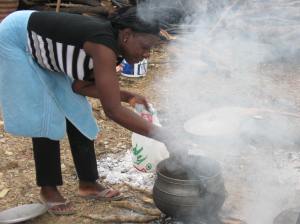
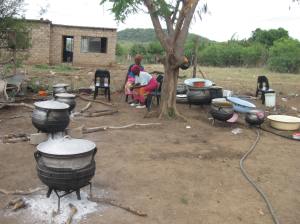
We arrived at 10:30. Several women were cooking outdoors. Their food preparations were almost complete. Each member of Pastor Ngomane’s family made their way to us in the next half hour and cheerfully greeted us. We sat under the tent, raised especially for the occasion, with several other family members and waited.
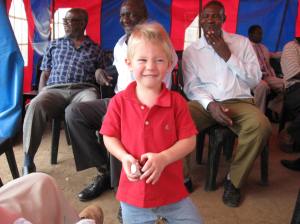
And waited some more.
And more. By now, the kids have been oohed and aahed over, and we’re actually having to come up with “real” conversation. ;) My husband has a great knack for this. I’m so glad I’m married to this guy! He got these gray heads shaking their heads and commiserating about the youth these days—you know, how they change the Tsonga language, and they’re not doing this or that right (like the old days).
Thankfully I had some paper and pen from the last church service in the diaper bag, as well as some cars. The cars kept the kids busy for the next few hours. I tried not to think about the chicken doo mixed in the sand they were driving the cars through. I have ceased to worry about their clothes getting dirty. (Notice the perfect color of Callie’s jumper—brown.)
Things perked up when a full taxi (15-passenger van) arrived. The guests filed in, singing, “We are coming into the Ngomane’s,” wearing matching shirts saying, “Kubayi Ngomane Clan.” Shortly thereafter, Seth was called to sit in on the DISCUSSION over the bride-price.
Several Ngomane family members filled a cleared-out bedroom, and Seth (my husband) was the drop of milk mixed in a sea of chocolate. Since neither Seth nor I knew exactly what he’d been called away for, I did not see him for the next two hours, which turned out to be a very taxing time period for a missionary mom with 4 kids 5 years old and under.
Of course, the bride's parents are there (not the bride herself—she sat outside, happy and nervous, the entire time), along with Pastor Ngomane's father, mother, and several of the aunts and uncles, men and women sitting together with their respective genders. The bridegroom’s family, surname Rihlampfu, filled out the sitting room.
Two messengers were sent from the Rihlampfu family to the Ngomane’s with R4,100 (currency here). Seth stands up to give them his chair, but is quickly motioned down by the Ngomane’s and threatened with a fine if he does that again. (He didn’t know that they really do fine for bad behavior! But I’m sure they were kindly teasing him in this case—though serious that there was an image they’re trying to hold up, and Seth wasn’t helping it!)
They copiously lay the money out on the floor for all to see. The Ngomane family starts to warm up. But when they see what is offered, they respond, “What did you come here to do? Give us some kind of offer that will open our mouths. Give us a reason to talk. These cows can’t get the whole job done.” (You can guess—cows were the method of payment in the past.)
The messengers are sent back with a messenger from the Ngomane’s to relay this comment. The Rihlampfu clan returns with R5,000 following the same display ceremony as previously. Some uncles are chiming in now. “When you have cows, you send them here, you send them there to plow. They work for you. What is this? This gets no work done, this is hardly anything.”
Pastor Ngomane's family wanted hard liquor, snuff, and cigarettes as part of their payment. Pastor N. had warned Seth in the beginning that his relatives loved drinking. Rihlampfu comes back, carrying two cases of cold drink (pop). Since both the bride and her young man are Christians, I’m glad to see the way the request for liquor was handled.
The groom’s family comes back a few more times offering a new suit of clothes for the father and some money to buy a blanket for the mother. But the Ngomane family scoffs at this: “That’s not even half what you need to buy a blanket. She loses her daughter, and you can’t even buy her a blanket to keep warm?”
More money is brought in. Pastor N’s father: “Go. Go back home.” He now starts to reference the money he was hoping for—R50,000. Some more rhetoric: “We raised her. We fed her, we paid for her. Now you want to come and take her for nothing.” Ngomane relays this message to Rihlampfu. More money is brought in. Now it’s trickling in in the form of smaller bills and coins, no more large denominations. Rihlampfu is trying to communicate that they are running out. Total is up to almost R25,000.
Pastor N’s father is unhappy, clearly stating now that they must reach R50,000. Rihlampfu brings back the message, “Please we ask for mercy. We have no more. Please we ask for water (ease).” The Ngomane’s take a hard stance; but the bride’s parents intervene. Pastor N.: “Look, we don’t want to hurt these people. Drop the price to R30,000, and let them owe us that small amount. I’m happy. Look at the suit, the cold drink, all the money. I’m fine with this.” Pastor N's wife adds, “I’m happy; I don’t want to hurt these people. This is enough.” She’s told in no uncertain terms by the patriarch of the family (Pastor's father) that she has no say as a woman in the house. She’s not cowed and continues to calmly state that she doesn’t want anymore.
Charity is one thing; bad manners are another. Ngomane decides that Rihlampfu must be fined R200 each for eight cultural misdemeanors that day. For one, when they all arrived, the groom’s family didn’t greet the bride’s family in the proper manner. Another—they hooted their horns on arrival, signaling that they had “already won the game before they’d even played.” Also the young men in their party did not take off their hats.
Rihlampfu returns with thanks for the R20,000 discount, and then displays a stack of bills to cover the last R5,000 or so. The Ngomane’s had added up exactly what Rihlampfu’s owe them. Pastor N. reminds them to add in the costs of the suit and cold drink in the payment amount. Calculators are pulled out. Seth, having kept a total in his mind throughout the process, announces the number, receiving a wide-eyed look. A family member checks his math on the calculator and announces that Seth was right. Pastor’s father, surprised, says, “White people!”
The final amount settled for the bride price is R30,000 (@$4,400, depending on the exchange rate). The families are moderately pleased with the exchange, and you hear a specifically Tsonga cheer all the way outdoors, signaling that the two will get married.
Seth was asked if he had to pay lovola for his wife? “No,” he responded, “people gave me gifts at our wedding.” ;) They rejoin, “No, but you had to get her a ring.” His answer: “Yes, but she gets to keep that!” They agreed that he should therefore be living with his in-laws because they are the ones who paid (meaning he can’t take care of his wife himself). Seth ended with, “Yeah, white people are nuts.” He was cheered by all in attendance.
A very tired mama and kids went home with Daddy right after this point, so I don’t know how they ended the party. Perhaps there were a couple of speeches and songs, but if nothing else, there was feasting and music with a DJ to run the computers and 4-foot high speakers. I admit that I had hoped to see more for myself, but instead had a discouraging couple of hours trying to handle the children in that scenario. I’m sure missionary mommy moments like these will only get easier when my kids are older. They have to!

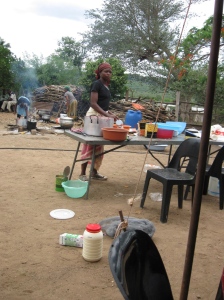
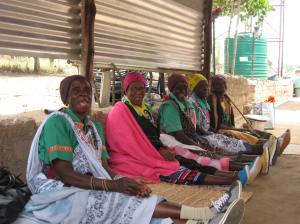
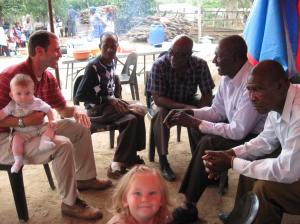
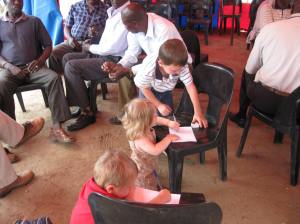
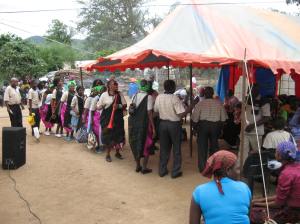
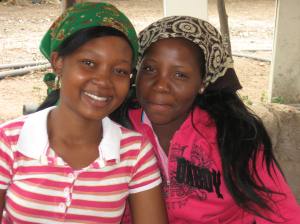
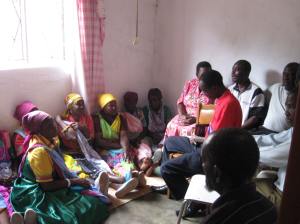
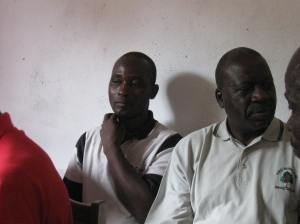
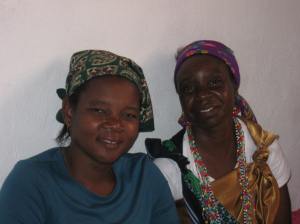
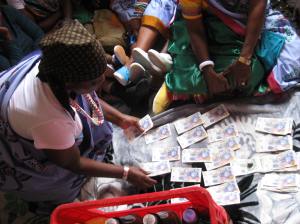
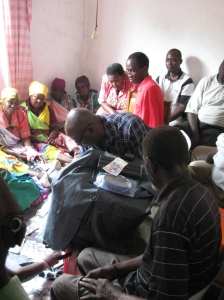
2 comments:
Wow! You did very well to keep track of all that and look after your children at the same time.
I saw a shorter version in a movie that came out in the last year or so, called "Fannie Fourie Lobola".
So much to learn when you minister to another cultural group. Looks like you are learning well.
Thank you! It was very interesting, and I'm glad we got the chance to see it. I'll have to see if I can locate that movie.
Post a Comment